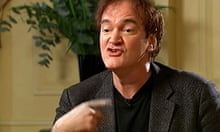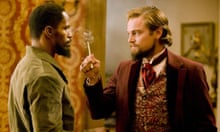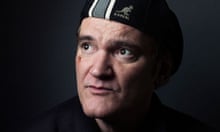I am no fan of the slavery revenge western Django Unchained but you will meet few people more enthusiastic than I was about the abrasive, straight-shooting television interview given this week by its writer-director Quentin Tarantino to Channel 4 News. The presenter Krishnan Guru-Murthy began by trying to explore Tarantino's interest in making violent films, only to be met with a polite brush-off: Judd Apatow doesn't get asked why he makes comedies, the director reasoned. So far, so logical. But then he tried to prod Tarantino into reflecting on whether there was any link between violence in movies and in real life. "It's none of your damn business what I think about that," came the reply, "I'm saying 'no'… If anyone cares what I have to say about it, they can Google me."
Guru-Murthy remained immobile in his seat, as Tarantino ranted and raved, giving the impression that his eyes were going to pop from their sockets. He also provided the first instance of the phrase "I'm shutting your butt down!" I've ever seen on British TV.
The problem here was not the issue of violence itself, but the wearisome ploughing of the same furrow. You've got Quentin Tarantino sitting in front of you, one of the most stimulating interviewees in the world, and you ask him questions that he was unpicking 21 years ago when he promoted his debut Reservoir Dogs? Tarantino's indignant response was proportionate and refreshing.
His prickliness should not detract from the points he scored against this pious style of questioning to which many news programmes resort whenever they are called upon to report on anything that intersects with popular culture. Like Graham Linehan, who objected on-air to the Today programme's bear-baiting discussion tactics over his stage adaptation of The Ladykillers, Tarantino refused to adhere to this rigged news agenda.
The promotional tour for the director's extravagantly violent and provocative fantasy was never going to resemble the usual round of red-carpet gladhanding. And it's true that the path to PR glory has already encountered a few interesting speed-bumps: there was the mischievous attempt by one of the film's stars, Samuel L Jackson, to goad an affable white interviewer into uttering the n-word, which features prominently in the movie's dialogue. And this week there was some discomfort expressed over the decision to market collectible Django Unchained action figures. Even though these 8-inch dolls are designed for memorabilia nuts rather than Toys R Us, there's still something disconcerting about the collision of merchandising and what Tarantino himself calls "the Auschwitzian aspect of the slave trade." But this is emblematic of the film itself, which deliberately examines an era of traumatic historical injustice through the grime-tinted glasses of the exploitation genre.
The Channel 4 News argument didn't address the meagre merits and political shortcomings of Django Unchained. Nevertheless, the rare glimpse it allows us behind the PR curtain is invaluable. It makes me recall the time I put a question to the director Abel Ferrara, who proceeded to slip into a dense and restful slumber before I had finished speaking. Or the afternoon I was standing outside a hotel room awaiting a private audience with Martin Scorsese, only to overhear him complaining that he had done enough interviews for one day. "I'm all wiped out," he protested loudly to his assistant. "I don't know how I'm gonna do Germany. I'll do it, but I don't know how." Poor me. And, for that matter, poor Germany.
The demands of the relentless publicity treadmill can lead to compromises on all fronts: the subject can be crotchety, the interviewer nervous and hurried, and nobody gets what they want. The inanity of being quizzed by the same jaded journalists competing for identical soundbites was the catalyst for Tarantino's blow-up. To be fair to journalists, the situation doesn't always work in our favour: spending between 10 and 30 minutes with your subject in a hotel room is unlikely to produce relaxed and forthcoming testimonies. But then it's the journalist's job to use that small window of time to pose the most disarming and unusual enquiries they can manage.
It was perhaps ungracious of Tarantino to bellow: "I'm here to sell my movie! This is a commercial for the movie, make no mistake." But I am inclined to blame tiredness, maybe jet-lag, since he is usually a witty interviewee. During the hour I spent with him in 2009 discussing his last picture, Inglourious Basterds, he was brilliantly, intelligently combative in a way which is rare in the mollycoddled trade-offs between movies and media.
Had he been less weary, he might have taken umbrage earlier in the Channel 4 interview, when Guru-Murthy asked "Why do you love violent movies?" That inane remark hardly takes into account the extraordinary sophistication of violence in Tarantino's work: from the camera steering away from an ear-severing scene in Reservoir Dogs to the various murders-in-long-shot in Jackie Brown, or the Busby Berkeley approach to shooting mass carnage in Kill Bill, Vol 1. If only the line of questioning on Channel 4 News had been as nuanced and considered as one of Tarantino's movies.


